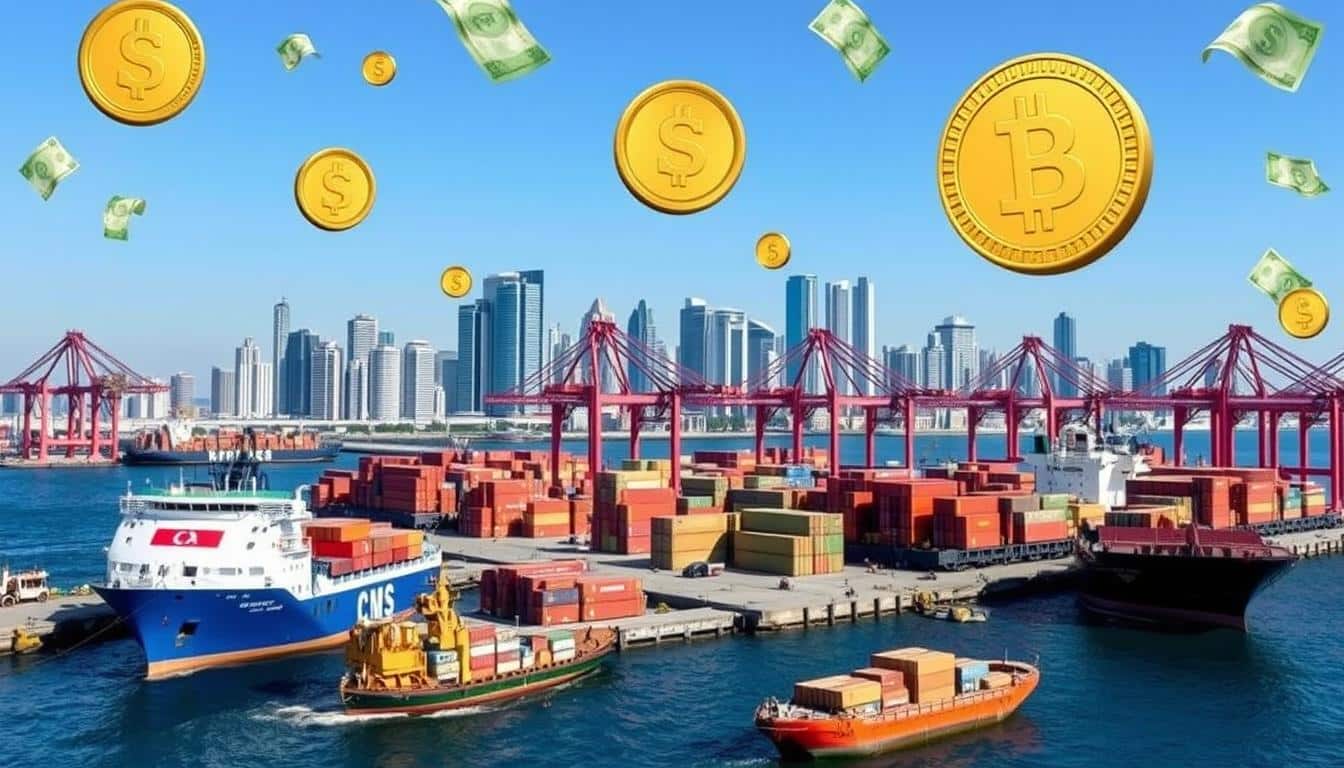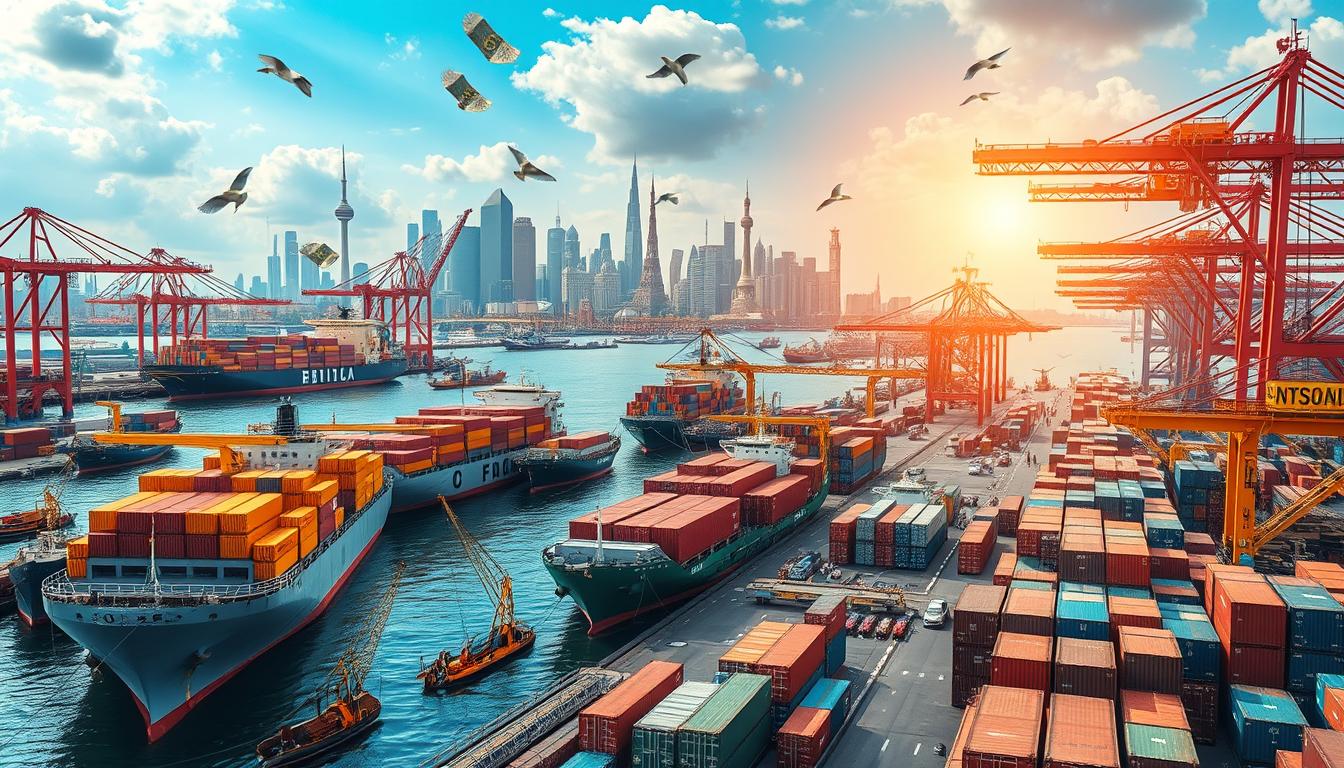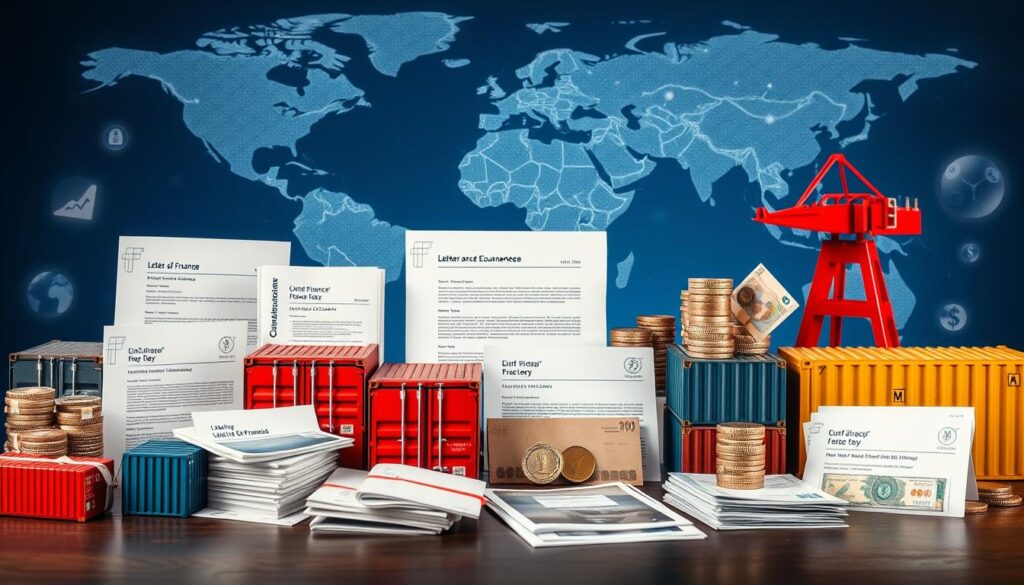Trade finance is all about the financial tools and products that help companies with international trade. It makes it easier for importers and exporters to do business across borders. This term covers many financial products that banks and companies use to make trade possible.
Trade finance helps lower the risks of global trade by meeting the different needs of exporters and importers. Without it, a company might struggle to pay on time and lose a key customer or supplier. This could have big effects on the company’s future. Options like revolving credit and accounts receivables factoring can help companies trade internationally and get through tough financial times.
Key Takeaways
- Trade finance helps with international transactions and commerce.
- It includes many financial products and tools for cross-border trade.
- Trade finance can lessen the risks of global trade.
- It offers financing solutions to importers and exporters, boosting cash flow and efficiency.
- Trade finance is key for companies to trade internationally and grow globally.
What Is Trade Finance?
Trade finance is key to global trade. It offers financial help to importers and exporters. This support reduces risks and makes trade smoother.
Trade Finance Definition and Key Takeaways
Trade finance uses financial tools and services for cross-border trade. These include lending, letters of credit, factoring, export credit, and insurance. These tools help build trust and give access to working capital for importers and exporters.
How Trade Finance Works
- Trade finance brings in a third-party, like a bank, to help with payment and supply risks.
- Exporters get paid or receive payments as agreed. Importers can get credit to buy goods.
- Important trade finance tools are lending, lines of credit, letters of credit, factoring, export credit, and insurance.
Trade Finance Reduces Risk
Trade finance solutions help importers and exporters. They build trust and make international deals easier. By using these solutions, risks like non-payment and currency changes are lowered. This lets businesses trade globally with more confidence.
“Trade finance is the lifeblood of global commerce, providing the financial solutions that empower businesses to participate in international trade with confidence and success.”
Benefits of Trade Finance

Trade finance is key to making international trade work smoothly. It helps businesses doing global trade by improving their money flow and work efficiency. It also boosts their earnings and revenue.
Improves Cash Flow and Operational Efficiency
Trade finance gives companies the money they need to run their businesses. It acts like extra credit, letting companies get paid early for their work. Tools like letters of credit also reduce the risk of not getting paid or not receiving goods. This makes money flow better and work more smoothly.
Increases Revenue and Earnings
Trade finance helps companies grow and make more money by trading with other countries. For example, a U.S. company might not have enough to make the goods needed for a sale with a partner abroad. But with export financing, it can make the goods and earn more money.
“Trade finance is a crucial tool for companies looking to expand their global reach and capitalize on international business opportunities.”
Using trade finance, businesses can get healthier financially. They become more competitive worldwide and find new ways to grow and make more money.
Trade Finance

Trade finance is all about the financial tools and products that help companies with international trade. It makes it easier for importers and exporters to do business. Finance for trade includes many financial products that banks and companies use to help with trade deals.
These financial instruments and products are key for global trade. They help reduce risks in cross-border deals, make sure payments are on time, and provide the cash needed for imports and exports.
| Trade Finance Product | Description |
|---|---|
| Letters of Credit (LCs) | A payment method where the buyer’s bank guarantees payment to the seller upon presentation of required documents. |
| Documentary Collections | A method where the seller’s bank collects payment from the buyer’s bank against delivery of shipping documents. |
| Trade Loans | Financing options that provide working capital to importers and exporters to support their trading activities. |
| Bank Guarantees | Financial instruments that guarantee the fulfillment of a contractual obligation, reducing payment risk. |
These financial products help businesses deal with the challenges of international trade. They reduce risks, improve cash flow, and help global trade grow.
“Trade finance is the lifeblood of global trade, enabling companies to confidently engage in cross-border transactions and expand their reach in the international marketplace.”
Global Trade Finance Program (GTFP)

The Global Trade Finance Program (GTFP) helps make international trade easier and supports growth in emerging markets. It offers risk solutions to banks, letting them grow their trade finance and reach new areas.
Program Structure
The GTFP gives partial or full guarantees to banks, covering the risk of trade transactions in tough markets. These guarantees work with different financial tools like letters of credit and performance bonds.
Advantages for Banks
- Provides access to a global network of confirming banks, making transactions easier under limited trade lines.
- Reduces the need for cash collateral, which frees up capital for banks.
- Offers technical help to simplify the complexities of trade finance.
GTFP Results
Since starting in 2005, the GTFP has seen great success. By the end of fiscal year 2020, it helped with over 68,000 trade deals, supporting more than $66.5 billion in trade in emerging markets. It didn’t have a single loss. In fiscal year 2020, the GTFP supported over $3 billion in trade in IDA countries, showing its dedication to helping these tough regions grow.
“The GTFP has been a game-changer in the world of trade finance, empowering banks to bridge the gap and unlock new opportunities for growth in emerging markets.”
Sustainable Trade Finance Solutions
As the world faces a growing climate crisis, businesses and banks are focusing on sustainable trade practices. The International Finance Corporation (IFC) and the Banking Environment Initiative (BEI) are working together. They aim to create new financing options that support sustainable global supply chains and trade in eco-friendly goods.
Sustainable Shipment LCs
The Sustainable Shipment Letter of Credit (LC) is one such solution. It gives special benefits for trading agricultural commodities that meet high sustainability standards. This approach encourages the move towards climate-smart trade and better sustainable global supply chains.
GTFP Climate Smart Trade
The GTFP Climate Smart Trade initiative offers price perks or longer financing for equipment and projects linked to the Global Trade Finance Program (GTFP). These projects must help fight climate change. This includes trading renewable energy parts and energy-efficient goods. The IFC is helping to cut carbon emissions and lessen climate change effects in global supply chains.
“Sustainable trade finance is key to a greener global economy. By promoting the trade of eco-friendly goods and supporting climate-smart projects, we can work towards a sustainable future for everyone.”
Trade Finance Products and Services

Global trade needs a wide range of financial solutions. HSBC offers a full range of trade finance products and services for its clients. These include everything from documentary credits to trade loans. They help businesses deal with the challenges of international trade.
Documentary Credits: Facilitating Secure Transactions
HSBC’s export documentary credits and import documentary credits are key in international trade. They make sure goods and services are paid for on time. They also lower the risk for buyers and sellers. By using a letter of credit, HSBC makes the trade process smoother and less uncertain.
Trade Collections: Efficient Cash Flow Management
HSBC’s export documentary collections and import documentary collections help manage cash flow well. They make collecting payments easier, keeping funds flowing and reducing the risk of not getting paid. This lets businesses focus on their main work without worrying about money.
Trade Financing Solutions: Empowering Business Growth
HSBC’s trade pay and trade loans give businesses the financial support they need to grow globally. These trade finance products help cover the gap between shipping goods and getting paid. With HSBC’s custom financing, businesses can take on new challenges and reach their goals.
| Trade Finance Product | Description |
|---|---|
| Export Documentary Credits | Ensures timely payment for goods and services exported by the seller |
| Import Documentary Credits | Provides risk mitigation for the buyer in an international transaction |
| Export Documentary Collections | Facilitates the efficient collection of payments for exported goods |
| Import Documentary Collections | Manages the collection of payments for imported goods on behalf of the buyer |
| Trade Pay | Offers flexible financing solutions to bridge the gap between shipment and payment |
| Trade Loans | Provides businesses with the capital needed to fund their trade activities |
HSBC’s wide range of trade finance products and services helps businesses confidently navigate global trade. These innovative solutions improve cash flow, reduce risk, and open doors for growth and expansion.
Also Read : 10 Simple Ways To Manage Your Finances Effectively
Conclusion
Trade finance is key to global trade. It offers financial tools that help importers and exporters manage risks in international deals. These solutions make it easier for businesses to trade across borders.
They reduce payment risks, improve cash flow, and help get financing. This lets companies trade with more confidence and efficiency.
Now, there are also sustainable trade finance options. These include Sustainable Shipment LCs and Climate Smart Trade. They show the industry’s effort to make global trade more responsible.
As the world trades more with each other, trade finance will become even more important. It helps grow and change international trade.
Trade finance helps reduce risks and make operations more efficient. It also increases revenue and profits. For importers, exporters, and financial institutions, knowing about trade finance can change the game in the global market.
FAQs
Q: What is the role of trade finance in facilitating export transactions?
A: Trade finance plays a crucial role in facilitating export transactions by providing financial solutions tailored to exporters. It mitigates risks associated with international trade by offering instruments such as letters of credit, which ensure payment upon the fulfillment of contractual obligations.
Q: How does supply chain finance benefit exporters and importers?
A: Supply chain finance benefits exporters and importers by improving liquidity and optimizing working capital. It allows businesses to extend payment terms with suppliers while enabling suppliers to receive early payment on their receivables, enhancing cash flow throughout the supply chains.
Q: What are export credit agencies and how do they support global trade?
A: Export credit agencies are financial institutions that provide financing and insurance to domestic companies for their export activities. They support global trade by offering export credit and risk distribution, helping businesses enter emerging markets with lower financial risk.
Q: What instruments and products are commonly used in trade finance?
A: Common instruments and products used in trade finance include letters of credit, bank guarantees, receivables finance, payables finance, and commodity finance. These tools help manage risks, provide liquidity, and facilitate transactions for both exporters and importers.
Q: How does invoice financing work in the context of trade finance?
A: Invoice financing allows exporters to receive immediate cash flow by selling their accounts receivables at a discount to a bank or a financial institution. This provides quick access to liquidity while the bank manages the collection of invoices from the buyers.
Q: What is the significance of commodity finance in international trade?
A: Commodity finance is significant in international trade as it helps businesses manage the financial risks associated with the trading of commodities. By providing financing against the value of commodities, it ensures that companies can maintain liquidity and manage cash flow effectively during trading operations.
Q: How do trade finance solutions assist corporates in emerging markets?
A: Trade finance solutions assist corporates in emerging markets by providing access to financial services that mitigate risks and enhance trade capabilities. This includes working capital solutions, which enable them to engage in international and domestic trade transactions more confidently.
Q: What role does foreign exchange play in trade finance?
A: Foreign exchange plays a critical role in trade finance by facilitating currency conversion required for cross-border transactions. Trade finance solutions often include foreign exchange services to help businesses manage currency risk and ensure they can transact effectively in global markets.
Q: How do banks ensure payment security in international trade transactions?
A: Banks ensure payment security in international trade transactions through the issuance of letters of credit. An issuing bank guarantees that the exporter will receive payment as long as they comply with the terms outlined in the letter, thus providing confidence to both suppliers and buyers.

